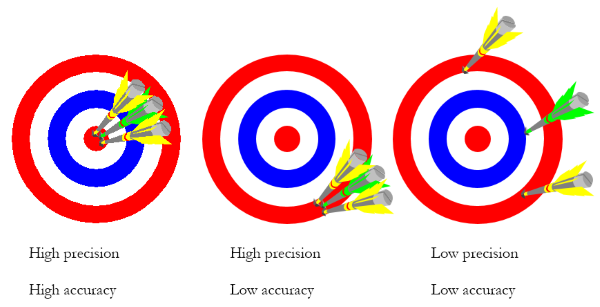I am writing as a student finishing up the first year of my PhD program. Before entering, I was excited, enthusiastic, and ready to tackle our generations most difficult problems (in my mind anyways)! However, as the days turned to weeks, and eventually as the weeks turned to months I became discouraged during my first year of study.
Something that most people don't realize is that a lot of research, even research published in highly regarded academic journals such as cell, nature, or PLoS, isn't precise. Precision is a funny thing... It is often ignored in the science field but cannot be overlooked in industry. To go into this let me explain to you the basic difference between precision and accuracy using the most common example used in every statistics 101 class.
Example
Being highly accurate means you have obtained results as expected. Let's say there is approximately 1 mg/ml of HIV antibodies in Patient A's blood. If I were to create a biosensor that is meant to detect HIV antibodies in human serum, and that biosensor told me there was 0.99mg/ml of HIV antibody in patient A's blood, I would consider my sensor highly accurate. However, precision is a completely different story. My sensor may give me a highly accurate reading, but precision is the process of repeatedly giving me the same readings (regardless of accuracy). So if I had a highly accurate and precise sensor, it would consistently give me values around 1mg/ml. If I had a highly precise but inaccurate sensor, it may consistently give me values around 0.5 mg/ml (for example). and if I had a highly inaccurate and non-precise sensor, it may give me values ranging from 10-100 mg/ml.

In science, we strive to find what is possible, in industry we figure out what is reliable and repeatable.
I was unfortunate enough to learn this the hard way. I came to lab 7 days a week constantly wondering why my experiments were not working, by the 2nd month in my lab I had amassed enough data to publish in a journal. However, something that bothered me is that the data I was generating and the results I was getting were not repeatable. The biosensors were not precise, but sometimes they were accurate. This is the case with many experiments published in many peer-reviewed journals. This is not entirely a bad thing, but the way scientists present their results are oftentimes poor. Again, showing that you've had a successful experiment is different from creating something that is industrial ready.
There is a silver lining to non-precise scientific findings
Accurate findings highlight current advances in technology, these advances are scrutinized and tested by companies in order to make reliable products. A perfect example, again, would be biosensors. Showing the possibility of early-detection of HIV will push the industry to develop a reliable test to do just that.
Overall, discovering the possibility of something new is great, but scientists need to do a better job reporting the reliability of their findings; non-precise results do not mean scientific failure, it just means that there are confounding variables that still need to be controlled for.
Thank you for reading, I may be posting a series on my experience starting up a biotech company in the near future, so feel free to like, comment, and follow me :)
Link to image location https://www.perten.com/Publications/Articles/NIR-Introduction1/
Hey that's an interesting post. I'll follow your account to see how you doing :). Please follow me @barteksiama.
Downvoting a post can decrease pending rewards and make it less visible. Common reasons:
Submit
Thanks, I'm glad you enjoyed it, I'll check out your channel!
Downvoting a post can decrease pending rewards and make it less visible. Common reasons:
Submit